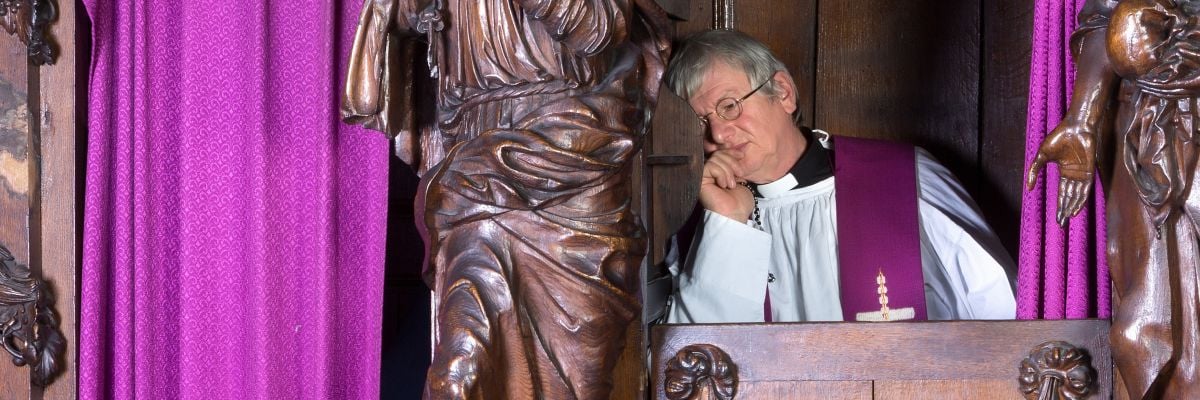
Episode 64: Year B – 6th Sunday of Ordinary Time
In this episode of the Sunday Catholic Word, we focus on several details found in all the readings for this upcoming 6th Sunday of Ordinary Time, Year B. Unlike what we’ve seen in all the previous episodes of the Sunday Catholic Word, these details aren’t as directly related to apologetical discussions as the details in previous readings. But given that they’re related in some ways, it’s worth mentioning. The relevant topics that we’ll be discussing is the Sacrament of Confession, the New Testament ministerial priesthood, respect for the Church’s disciplinary precepts, a healthy approach to disciplinary laws of the Church and their relationship to love, and the Gospel portrait of Jesus as an exorcist.
Readings: Click Here
Looking for Sunday Catholic Word Merchandise? Look no further! Click Here
Transcript
Hey everyone,
Welcome to The Sunday Catholic Word, a podcast where we reflect on the upcoming Sunday Mass readings and pick out the details that are relevant for explaining and defending our Catholic faith.
I’m Karlo Broussard, staff apologist and speaker for Catholic Answers, and the host for this podcast.
In this episode, we’re going to focus on several details found in the readings for this upcoming 6th Sunday of Ordinary Time, Year B. Unlike what we’ve seen in all the previous episodes of the Sunday Catholic Word, these details aren’t as directly related to apologetical discussions as the details in previous readings. But given that they’re related in some ways, they’re worth mentioning. The relevant topics that we’ll be discussing is the Sacrament of Confession, the New Testament ministerial priesthood, respect for the Church’s disciplinary precepts, a healthy approach to disciplinary laws of the Church and their relationship to love, and the Gospel portrait of Jesus as an exorcist.
Let’s start with the first reading, taken from Leviticus 13:1-2, 44-46. As will become evident, this serves as the background for what we read in the Gospel.
The LORD said to Moses and Aaron,
“If someone has on his skin a scab or pustule or blotch
which appears to be the sore of leprosy,
he shall be brought to Aaron, the priest,
or to one of the priests among his descendants.
If the man is leprous and unclean,
the priest shall declare him unclean
by reason of the sore on his head.
“The one who bears the sore of leprosy
shall keep his garments rent and his head bare,
and shall muffle his beard;
he shall cry out, ‘Unclean, unclean!’
As long as the sore is on him he shall declare himself unclean,
since he is in fact unclean.
He shall dwell apart, making his abode outside the camp.”
Now, in the Gospel, which is taken from Mark 1:40-45, we read about Jesus healing a “leper” and commanding him to “show [himself] to the priest and offer for [his] cleansing what Moses prescribed.” The first reading for this upcoming Sunday serves as part of the background for this injunction that Jesus gives to the leper.
The first reading records the precept for a leper to show himself to the priest when he contracts leprosy and to be declared unclean. Jesus is referring to part of the precept for a healed leper to show himself to the priest to be declared clean, which is recorded in both Leviticus 13 and 14.
It’s this idea of the leper having to go to the priest to be declared physically and ritually unclean and clean that I want to focus on here. It has at least some relevance to the Sacrament of Confession and thus is worth considering.
Now, let’s be clear: in no way am I asserting this as a proof text for the Sacrament of Confession. What I am saying, however, is that this illustrates how God willed to associate cleanness with his priests. In this case, it’s physical and ritual cleanness.
But earlier in Leviticus we discover that God willed to associated spiritual cleanness with his priests as well. Consider, for example, Leviticus 5:5-6, where Moses says,
5 When a man is guilty in any of these, he shall confess the sin he has committed, 6 and he shall bring his guilt offering to the LORD for the sin which he has committed, a female from the flock, a lamb or a goat, for a sin offering; and the priest shall make atonement for him for his sin.
Here, we have an instruction for the sinner to confess his sins and bring a sacrifice to the priest to be offered for his sins. God saw it fitting that his priests be involved in the process of forgiving his people of their sins.
Now, if God saw it fitting to involve his ordained priests when forgiving his people of their sins in the Old Covenant, then it’s at least reasonable to think that God might have ordained priests in the New Covenant and involve them when he forgives his people of their sins.
And this plausibility is revealed to be fact in John 20: 23 when Jesus tells his apostles, “If you forgive the sins of any they are forgiven. If you retain the sins of any they are retained.” Jesus involves the apostles in the ministry of forgiving sins. When read against the backdrop of Leviticus 5:5-6, Jesus’ instruction for the apostles to forgive sins is a strong indication that Jesus made the apostles his New Testament ministerial priesthood.
Now, these precepts involving lepers have further implications for the Sacrament of Reconciliation. Just as a leper could be restored to normal life within the community of the Israelites through the ministry of an ordained priest, especially to the life of worship, so too a grave sinner, through the ministry of an ordained priest in the Sacrament of Reconciliation, is restored back to the life of the Church and to liturgical worship, particularly the worship of receiving Jesus in Holy Communion.
The leprosy, therefore, is a symbol of grave sin. And the leper’s restoration to the life of Israel is a symbol of a sinner’s restoration to the life of the Church, the New Israel.
Jesus’ instruction for the leper to show himself to the priest gives rise to another topic for discussion: respect for disciplinary precepts. Jesus shows his respect for the Mosaic Law, which at the time was still binding for Jews since Jesus hadn’t fully revealed his abrogation of such precepts.
This gives us an opportunity to reflect on the importance of obeying Holy Mother Church’s disciplinary precepts, such as not eating meat on Fridays during Lent, attending Mass on holy days of obligation, and following liturgical rubrics, etc. I’m reminded of the early Gentile Christians having to follow the Council of Jerusalem’s disciplinary precepts of abstaining from meats offered to idols and meats not fully drained of blood, as recorded in Acts 15. Following the Church’s disciplinary precepts is something that’s expected of us as faithful sons and daughters of Holy Mother Church.
Now, in the healing of the leper Jesus also gives us a healthy or balanced view of disciplinary laws. Mark tells us Jesus “touched” the leper (Mark 1:41). According to the Mosaic Law, as recorded in Leviticus 13-14, the Israelites were forbidden to touch a leper.
There’s a principle embedded here that we would do well to heed: disciplinary/ceremonial laws give way to the law of love when the two collide.
It would seem this is a theme Holy Mother Church is highlighting for this upcoming Sunday Mass readings because the second reading from 1 Corinthians 10:31-11:1 is about this very issue. Paul writes,
Whether you eat or drink, or whatever you do,
do everything for the glory of God.
Avoid giving offense, whether to the Jews or Greeks or
the church of God,
just as I try to please everyone in every way,
not seeking my own benefit but that of the many,
that they may be saved.
Be imitators of me, as I am of Christ.
Here, Paul’s focus is the freedom Christians have concerning laws about eating and drinking. But even though a Christian has such freedom, he still ought to have charity at the fore front of his mind when relating to others who aren’t aware of such freedom.
So, if a first century Christian were to find himself in a situation where he’s asked by his Jewish friend to not eat meats offered to idols, rather than saying, “Hey, I’m free from that precept,” Paul seems to be suggesting that a Christian humbly concede the request. The intent would not be justification by the law. Rather, it would be to not give offense to the person and thereby keep the relationship going for the sake of being able to evangelize him.
I think as Catholics we have a tendency to focus so much on the disciplines of the Church that we lose sight of that to which the disciplinary precepts are ordered: love. Just something to keep in mind.
There’s one last detail that I want to point out in the Gospel reading. Many scholars point out that a plausible reading of the passage is to read it as an exorcism. There are a couple reasons they think this.
First, Mark tells us in 1:41 that Jesus was “moved with pity.” Many have pointed out that this can also be translated as “moved with indignation/anger.” Then, in verse 43, Jesus “sternly” charged the leper to not say anything. The Greek word translated “sternly” connotes indignation or anger.
The question becomes, “Why would Jesus be so moved with indignation by the leper? Also, why would he be so harsh to the leper after healing him?”
Well, some scholars suggest that perhaps Jesus was addressing a demon rather than the leper, and thus driving a demon out of the leper who was causing the leprosy. One thing that fits with this interpretation is Mark’s previous mentions of Jesus’ exorcism ministry in the immediately preceding verses: vv. 21-28, 34 and 39.
Secondly, the Greek word translated “dismissed” literally means “to expel” or “drive out” and is the word used in several places that speaks of Jesus driving out demons: Mark 1:34, 39; 3:15, 22; 6:13; 7:26; 9:18, 28.
So, if we interpret this passage as a narrative of Jesus driving out a demon, it would add one more piece of evidence to the historical reliability of the Gospel portrait of Jesus as an exorcist, which we talked about at length in last week’s episode.
CONCLUSION
Well, my friends, that does it for this episode of the Sunday Catholic Word. Although the readings for this upcoming 6th Sunday of Ordinary Time, Year B, don’t give us any explicit apologetical details, they do provide us with some information that either indirectly relates to apologetical topics or gives us an opportunity to reflect on an apologetical topic. Such topics include:
- The Sacrament of Confession,
- The New Testament ministerial priesthood,
- Respect for the Church’s disciplinary precepts,
- A healthy approach to disciplinary laws of the Church and their relationship to love, and
- The Gospel portrait of Jesus as an exorcist.
As always, I want to thank you for subscribing to the podcast. And please be sure to tell your friends about it and invite them to subscribe as well at sundaycatholicword.com. You might also want to check out the other great podcasts in our Catholic Answers podcast network: Cy Kellet’s Catholic Answers Focus, Trent Horn’s The Counsel of Trent, Joe Heschmeyer’s Shameless Popery, and Jimmy Akin’s A Daily Defense, all of which can be found at catholic.com.
One last thing: if you’re interested in getting some cool mugs and stickers with my logo, “Mr. Sunday podcast,” go to shop.catholic.com.
I hope you have a blessed 6th Sunday of Ordinary Time. Peace!



